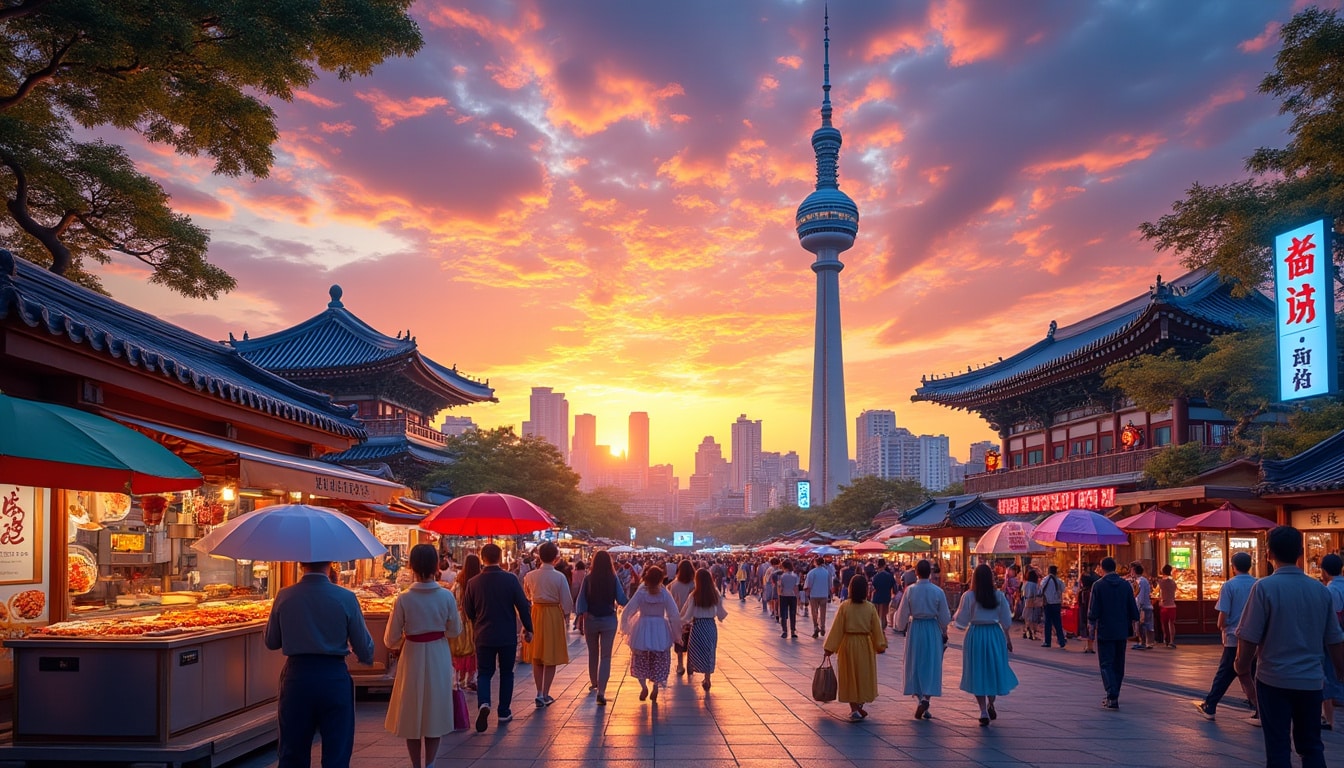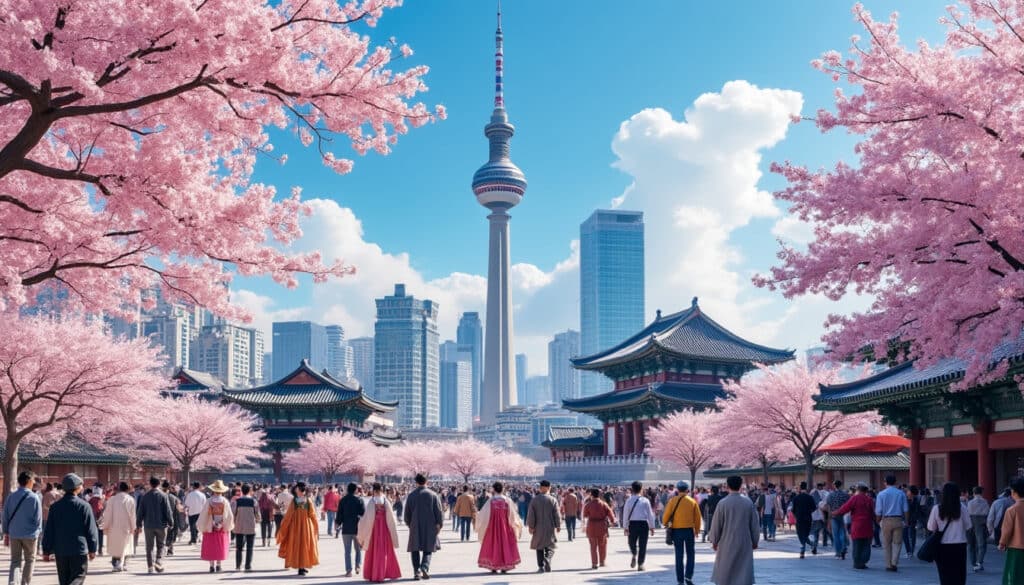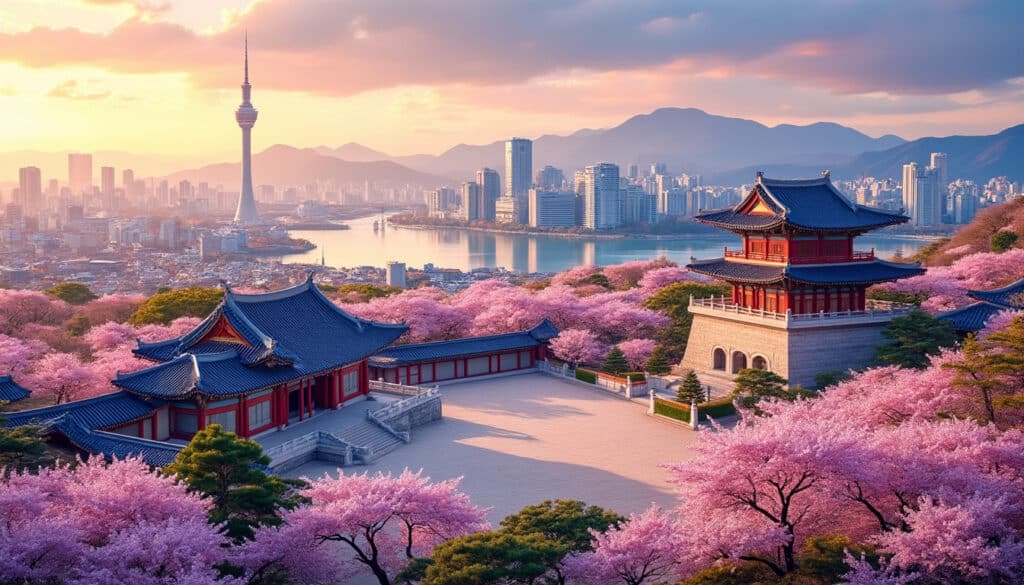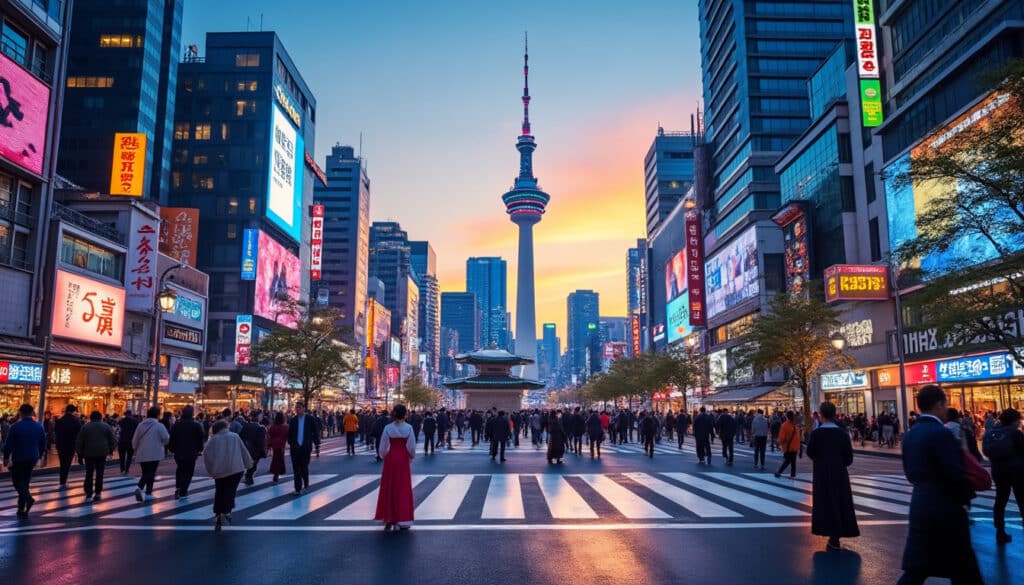Seoul, South Korea’s sprawling metropolis, is a city that engages all the senses. As you navigate its bustling streets, you’re enveloped by a panorama of contrasting elements: sleek skyscrapers shoot up next to ancient palaces, neon-lit alleyways buzz with life alongside serene hanok villages, and everywhere you look, cherry blossoms bloom in sophisticated harmony. From the hum of busy marketplaces to the rich scents wafting from street food stalls, every corner of Seoul tells a vivid story.
Visual Vibes: What Does Seoul Look Like?
Seoul’s visual landscape is a tapestry woven with both modernity and tradition. On one side, the skyline is dotted with architectural wonders like the iconic Lotte World Tower dominating the cityscape. This impressive 123-story structure not only commands a stunning view of Seoul but also reflects the city’s rapid urban development. Yet, right in the heart of this cyber-punk setting, the historic marvels like Gyeongbokgung Palace remind one of Korea’s deeply rooted culture.
Seoul’s palaces serve as profound cultural landmarks. Take Changdeokgung Palace, for example, it’s a masterclass in architectural elegance. Here, one can witness traditional Korean aesthetics where the palatial building design is harmoniously aligned with the landscape, offering a relaxing visual retreat amid a bustling city. Such spaces are perfect for a slow afternoon stroll, providing plenty of spots for contemplative moments.
The vibrant street markets in Seoul further enhance the visual feast. Places like Namdaemun and Dongdaemun are not just for shopping; they ignite the senses with the hustle and bustle of commerce. The neon lights of these markets illuminate the streets and the faces of locals and tourists alike, creating a kaleidoscope of colors that epitomize modern Korean dynamism.
Meanwhile, the lesser-known Ihwa Mural Village offers a different kind of visual delight. The village, often referred to as a living canvas, is adorned with murals that transform everyday walls and steps into engaging art pieces. It exemplifies the blend of creativity and community spirit, turning this once-neglected neighborhood into an animated expression of Seoul’s artistic side.
Seoul is also home to smaller neighborhoods like Bukchon Hanok Village, where time feels paused. Here, you can walk down cobbled paths, past traditional wooden houses, and accept that the modern clamor of the city is exchanged for a nostalgic step back in time. It’s a beloved spot for capturing the perfect hanbok-wearing photo or just immersing oneself in Korea’s yesteryear charm.
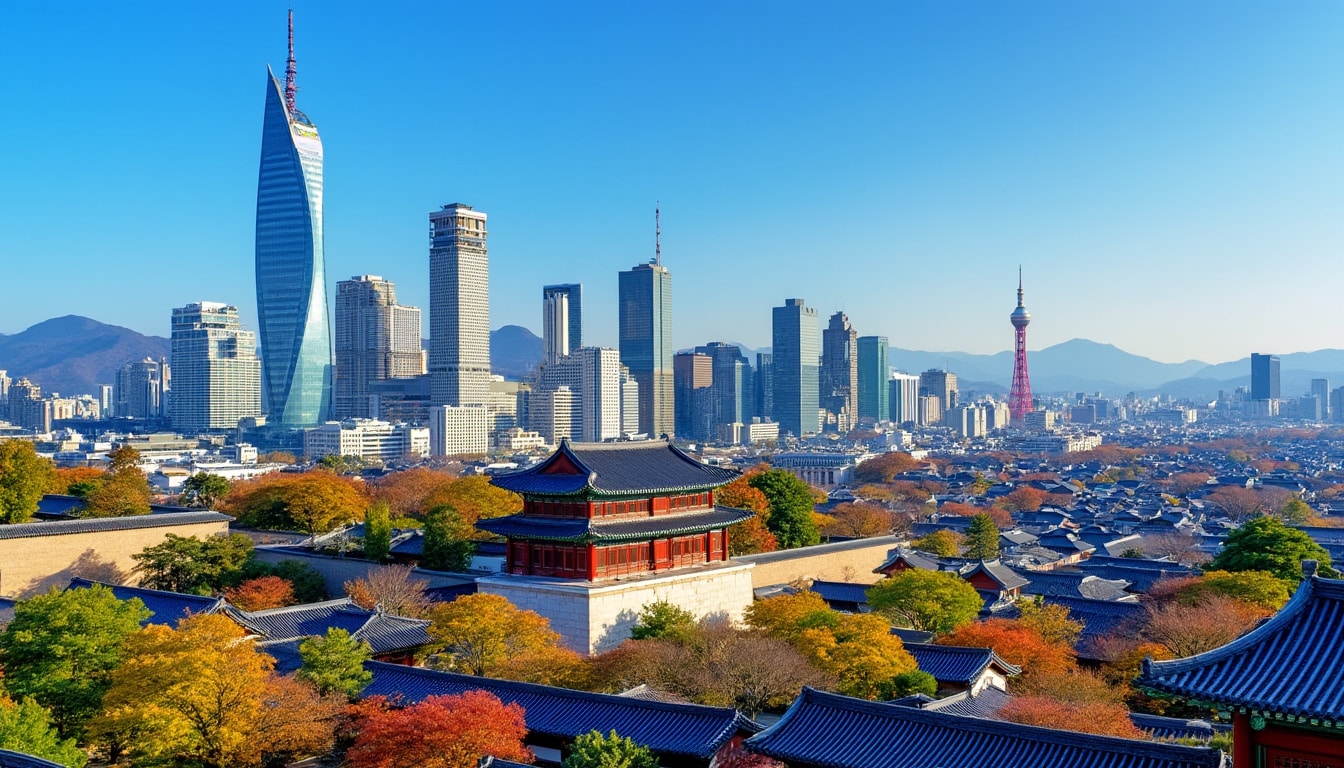
Despite its rapid modernization, suburbs like Gangnam have become icons of urban success. Known worldwide thanks to the viral K-pop hit “Gangnam Style,” the area blends cutting-edge fashion boutiques, pulsating nightlife, and innovative pop culture into one seamless entity. Such districts capture the essence of what it means to be a forward-thinking city continuously reinventing its narrative.
In summary, Seoul’s visual identity is a dynamic equilibrium of old and new, a city that wears its historical legacy with pride while embracing the future’s possibilities.
The Sensory Delight: Smells and Sounds of Seoul
The smell of roasted chestnuts in winter or wafts of sizzling meat from the numerous Korean barbecue joints is enough to melt the heart of any food lover. These olfactory experiences are more than appetizing aromas; they are deeply embedded in Korea’s rich culinary traditions. Vendors at food kiosks tempt passersby with the inviting scent of tteokbokki—a spicy rice cake stew, and hotteok—a deliciously sweet-filled pancake. Such aromatic vignettes are part of Seoul’s culinary landscape, serving as heartwarming reminders of the city’s street food culture.
Aside from food, the smog occasionally rests over the city like a somber veil. Yet, even this aspect becomes part of what defines Seoul, as it stands as a testament to the relentless pace and activity that characterize this cosmopolitan hub. While initiatives are ongoing to tackle pollution, the smog does highlight the environmental challenges faced by rapidly developing urban centers.
The soundscape of Seoul is equally eclectic. Traditional Korean music often drifts from cultural centers such as the National Gugak Center, offering a melodic contrast to the energetic beats emanating from K-pop dance studios. In the quiet of the morning, you might hear the gentle rustle of hanbok fabric or the quiet hum of a subway train arriving at its station.
However, as night falls, Seoul transforms. It comes alive with a symphony characterized by the chatter of people, the rhythmic honking of taxis, and the echoing laughter spilling out from rows of karaoke rooms. This creates an undercurrent of vibrancy that pulses through the city like a heartbeat, ensuring there is never a dull moment.
Touch and Feel: The Tactile Experience of Seoul
The tactile experience in Seoul extends beyond its objects and infrastructure to encompass the textures of its cultural practices. The smooth, polished surface of a porcelain tea cup in Insa-dong teahouses invites a gentle touch, while traditional Korean hanboks beg to have their exquisite silk felt. With a rich history that places importance on aesthetics, Seoul is a city that deserves to be explored not just through sight but through touch—every fold and seam of its traditions speaks stories that are centuries old.
Each time you step onto the old wooden floors of a hanok, there’s a real connection to the past. The soles of your feet feel it in the grain and texture of aged wood that has witnessed generations. In contrast, the cutting-edge interiors of modern Seoul buildings offer sleek lines and glossy finishes—alluding to the city’s ambitious drive into the future.
Markets provide yet another layer of tactile experiences. Whether it’s the texture of fresh produce at Gwangjang Market or the soft textile offerings at Dongdaemun, there’s a physicality to shopping in Seoul’s markets that appeals to the senses. You’re encouraged to sample, touch, and explore items up close, inviting a more intimate and meaningful shopping experience.
Public parks present a different touch with their verdant expanses. Subtle sensations abound—walking barefoot in the grass of Namsan Park, tracing the surface of Seoul Forest’s trees, and feeling the gentle brush of cherry blossoms in Spring. These interactions with nature are not just soothing; they’re integral parts of experiencing Seoul’s more serene side.
Further, the city’s immersive museums, like the Alive Museum, invite you to touch and engage with their exhibits, allowing visitors a direct interaction that most traditional museums shy away from. In this interactive environment, visitors become a part of the art itself, bringing the tactile element of exploration to life.
Culinary Wonders: The Taste of Seoul
Seoul is nothing short of a gourmand’s paradise, with a culinary scene renowned for its diversity and rich flavors. The city’s food offerings are as dynamic as its skyline, ensuring every meal is an adventure for the senses. Street food, such as the popular samgyeopsal (grilled pork belly), reflects Seoul’s love for communal dining, while restaurants serve dishes with a delightful mix of modern tastes and traditional techniques.
Food establishments range from intimate local eateries serving bibimbap—a comforting bowl of rice mixed with various toppings, to high-end Michelin-star restaurants offering fusion dishes that push culinary boundaries. One cannot speak of Seoul’s culinary landscape without mentioning kimchi. This fermented vegetable dish is a staple of Korean meals, and its variety—from spicy to mild, from cabbage to radish—continues to entice food lovers worldwide.
Besides savory delights, Seoul offers a vibrant dessert culture. Traditional sweets like patbingsu—a shaved ice dessert topped with sweet red beans, not only satisfy sweet cravings but also celebrate Korea’s innovative cooking. Moreover, the city is dotted with cafes where artisanal coffee is crafted with the same dedication expected from the most passionate baristas.
Embark on a culinary journey across Seoul’s various food districts such as Hongdae, where youthful enthusiasm is reflected in trendy food spots serving dishes like Korean fried chicken paired with draft beer. Alternatively, a visit to the historic district of Insadong offers a more traditional food experience, with teahouses that embrace age-old brewing methods to serve the finest traditional teas.
For those looking to venture into food markets, Gwangjang Market stands out with its vibrant congregation of food stalls. Here, delicacies like bindaetteok (mung bean pancakes) are freshly prepared, inviting tasters to experience the authenticity of Korean street food.
The Soul of Seoul: Cultural Experiences
Delve into the soulful essence of Seoul through its cultural experiences and legacies, which are intricately interwoven into the city’s everyday life. From royal traditions preserved at the grand Deoksugung Palace to the joyful hanbok-wearing tourists strolling through Bukchon Hanok Village, Seoul represents a unique blend of honored tradition and joyful modernity.
The city’s calendar is punctuated by festivals that showcase Korea’s vibrant cultural heritage. The annual Seoul Lantern Festival is a sight to behold as the Cheonggyecheon Stream becomes illuminated with an ethereal glow from handcrafted lanterns. Each event taps into an aspect of Korean culture or history, providing a deeper connection to the past.
Seoul’s performing arts scene is equally important in expressing the city’s vibrant cultural identity. Traditional performances such as the Korean folk dance and the vocal pansori are regularly hosted at venues like the Jeongdong Theater, celebrating the nuances of Korean storytelling. Meanwhile, contemporary performances, including K-pop concerts at major venues like the Jamsil Arena, showcase Korea’s influence on global pop culture.
- 🎭 Cultural performances at Jeongdong Theater
- 🎨 Interactive exhibits at Dongdaemun Design Plaza
- 🎵 K-pop concerts echoing through Jamsil Arena
- 🎆 Seoul Lantern Festival illuminating Cheonggyecheon Stream
Adding to Seoul’s cultural tapestry are the many museums dotting the cityscape. The National Museum of Korea provides an expansive view of Korean history, art, and culture, while the contemporary exhibits at the Seoul Museum of Art offer insights into modern-day expressions. These institutions serve as cultural touchstones that deepen understanding and appreciation of Seoul’s evolving story.
Discovering Seoul is about uncovering layers of its rich cultural history while embracing the dynamic forces of change that continue to redefine this cosmopolitan city.
FAQ
- What is the best time to visit Seoul?🌸 The best time to visit Seoul is in the spring (April to May) when cherry blossoms are in bloom, or in the fall (September to November) for its stunning foliage and mild weather.
- Is Seoul a safe city for travelers?🛡️ Yes, Seoul is considered safe for travelers, with crime rates being relatively low. However, it is always advisable to remain cautious in crowded areas.
- What is the best way to get around Seoul?🚇 The Seoul Metropolitan Subway system is efficient, affordable, and comprehensive, making it the best choice for navigating the city.
- What local dishes should I try in Seoul?🍲 Must-try dishes include bibimbap, kimchi stew, tteokbokki, and Korean barbecue. For dessert, indulging in some patbingsu is highly recommended.
- Where can I experience traditional Korean culture?👘 Bukchon Hanok Village offers a walked-back-in-time experience with its traditional houses and cultural workshops where visitors can try wearing hanbok.
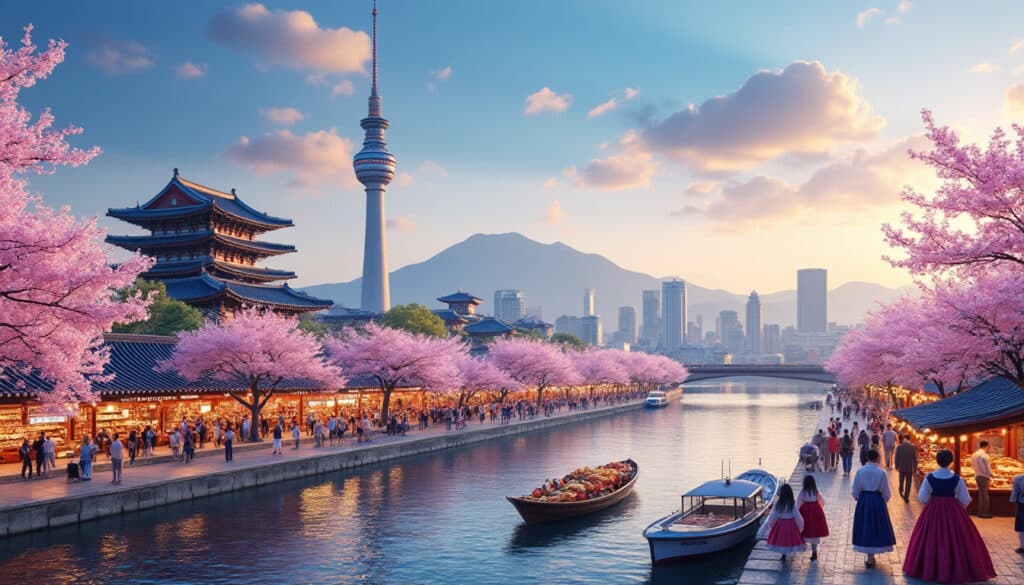
Fun Facts & Curiosities About Seoul
Seoul, a dazzling fusion of modernity and tradition, captivates every visitor with its vibrant blend of history, culture, and innovation. From being a technological metropolis to a cultural capital, the city offers a myriad of interesting facets waiting to be…
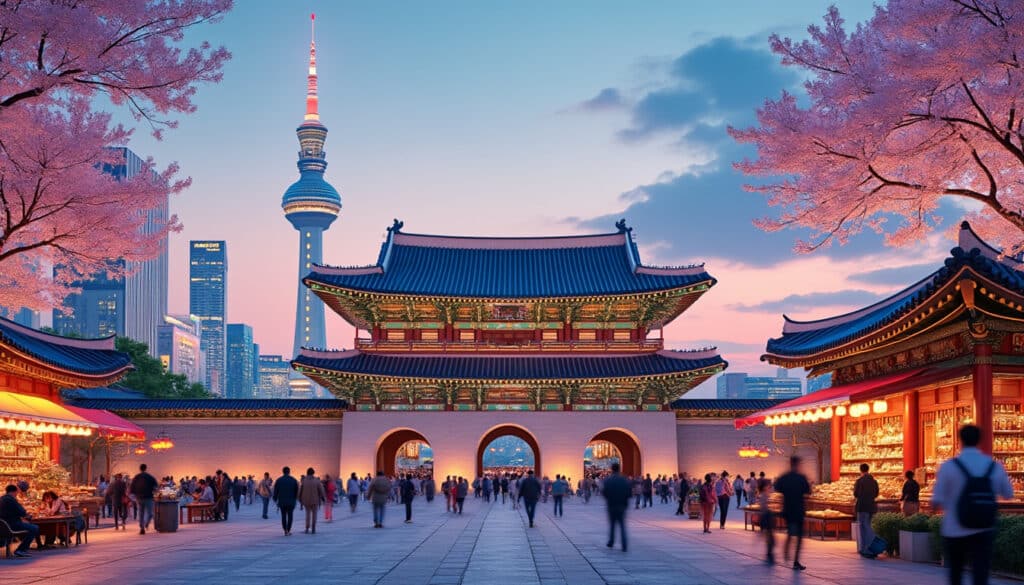
Architecture and urban features of Seoul
Seoul, South Korea’s vibrant capital, stands as a dynamic fusion of traditional culture and modern innovation. The city’s architectural wonders are a testament to its rich history and cutting-edge design principles, weaving a tapestry where ancient palaces coexist with towering…
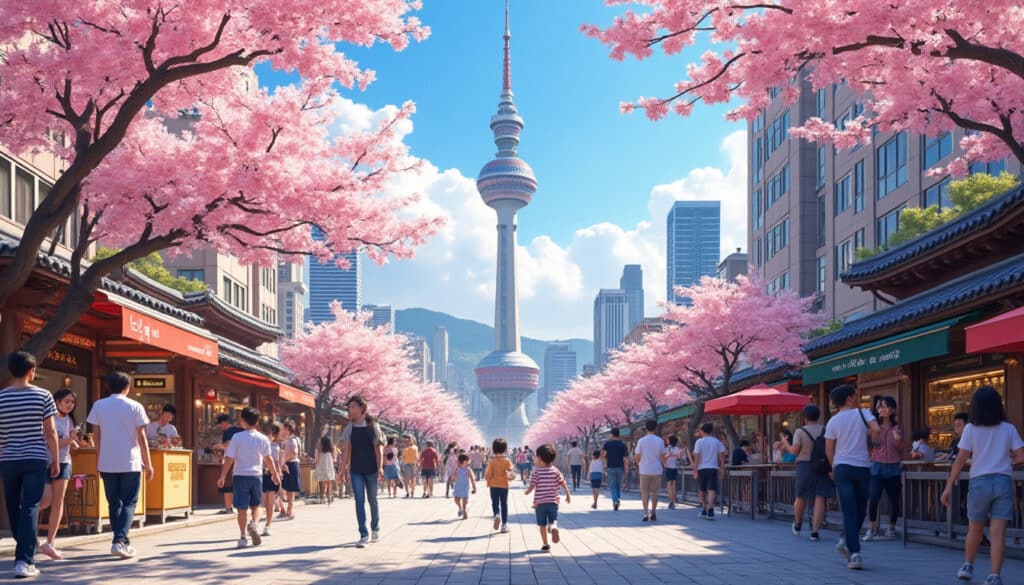
Seoul is a bustling metropolis where the ancient and modern coexist harmoniously. From its rich history rooted in time-honored traditions to its vibrant nightlife and technological advancements, this city is a haven for both tourists and expats. Stepping into Seoul…
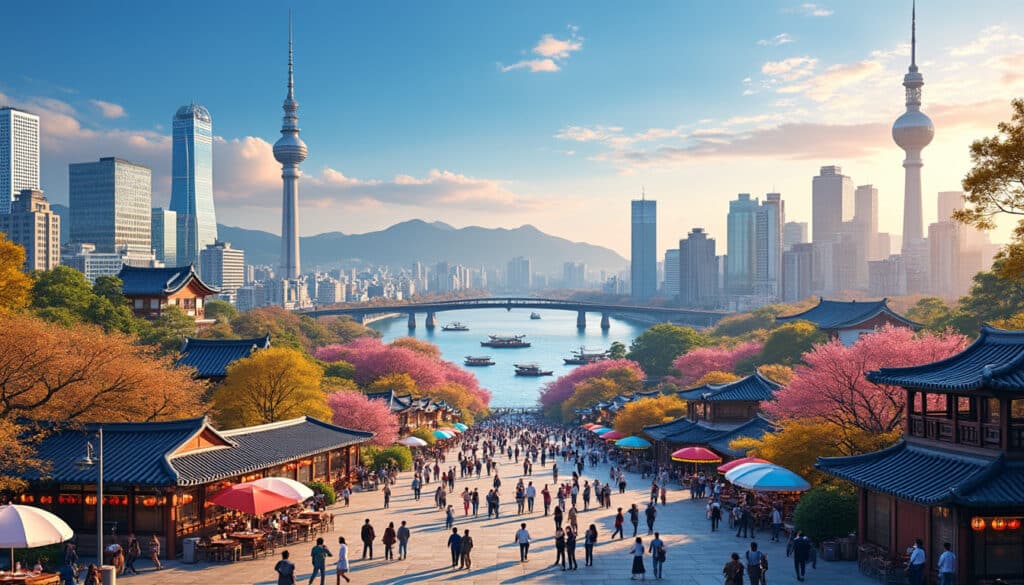
Demographics and geography of Seoul
Seoul, the vibrant capital of South Korea, stands as a testament to the country’s rapid development and cultural evolution. Nestled along the banks of the Han River in the northwestern corridor of the Penninsula, Seoul represents a harmonious blend of…
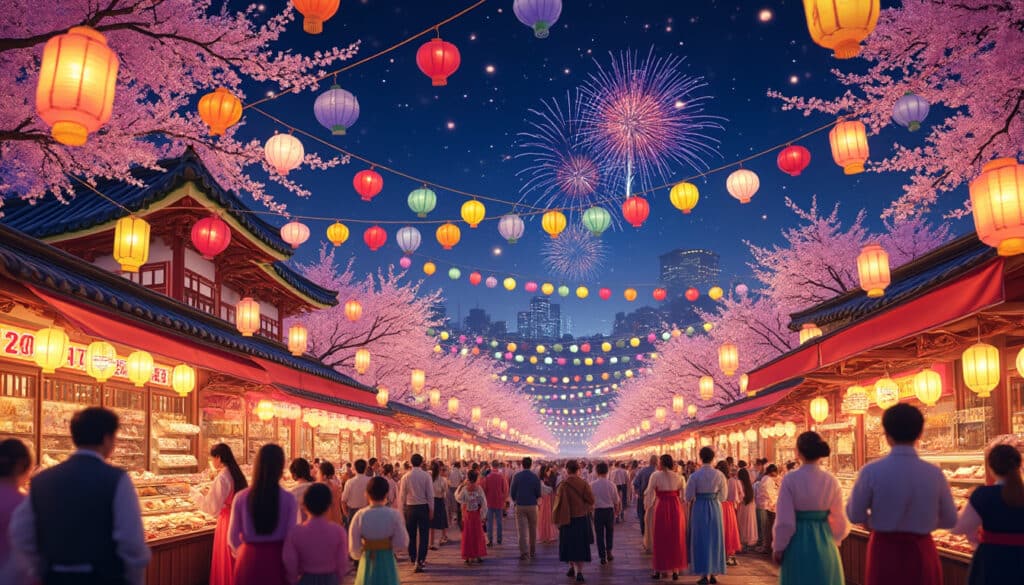
Holidays and celebrations in Seoul
Seoul, the heart of South Korea, is where traditions meet modernity, creating a unique tapestry of cultural and contemporary celebrations. The city, known for its vibrant lifestyle and rich history, transforms into a festive wonderland during public holidays. From historical…
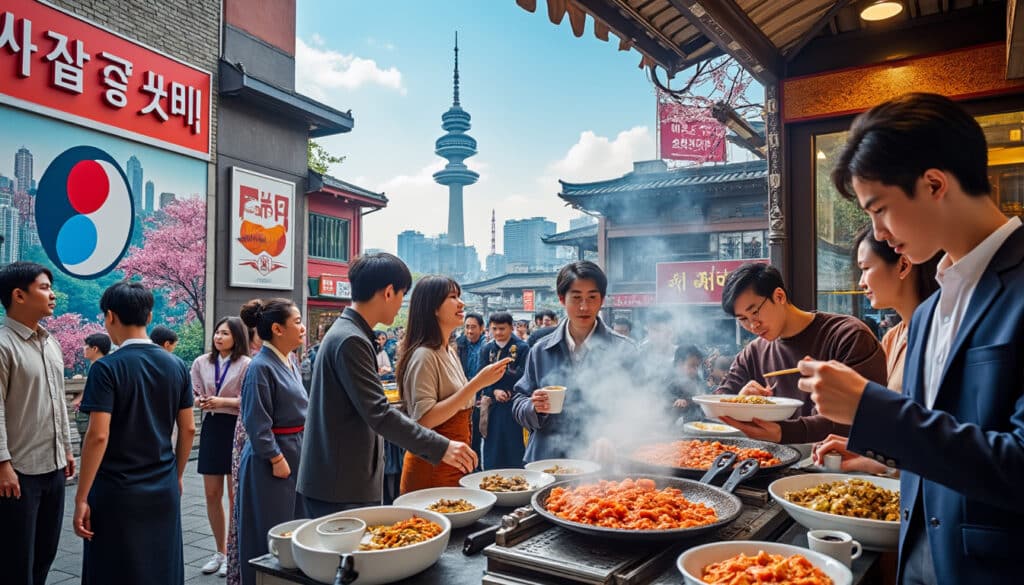
Language and spelling of Seoul
Seoul, the bustling capital city of South Korea, is not just a hub of rapid technological advancements and modern culture, but also a treasure trove of linguistic history and evolution. The city’s language and spelling conventions offer a window into…
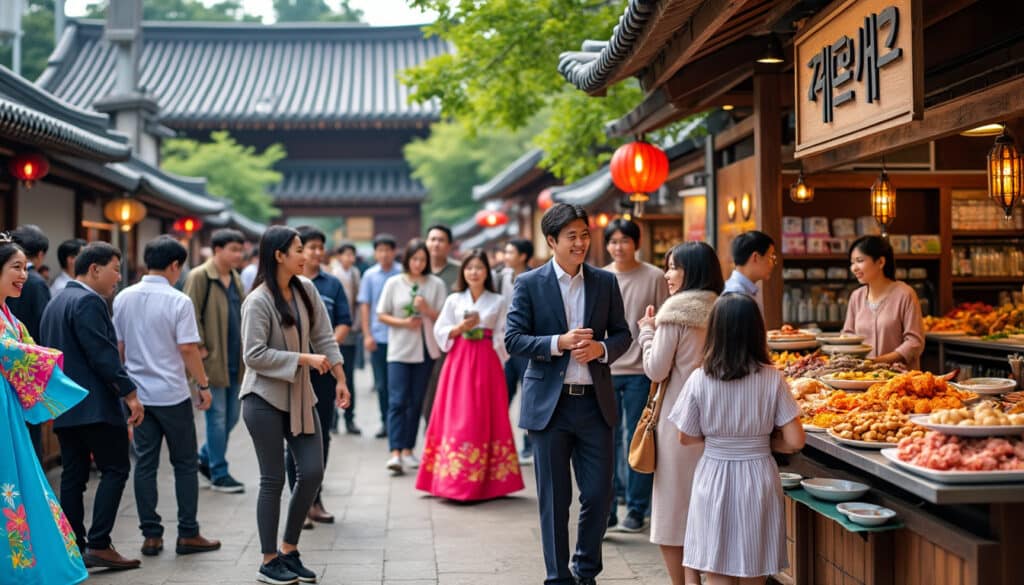
Local tips for tourists in Seoul
Seoul, the vibrant capital of South Korea, offers a fusion of ultra-modern skyscrapers and ancient palaces, bustling markets, and serene temples. However, while embarking on a journey to this dynamic metropolis, tourists often miss the oddly charming, unconventional spots that…
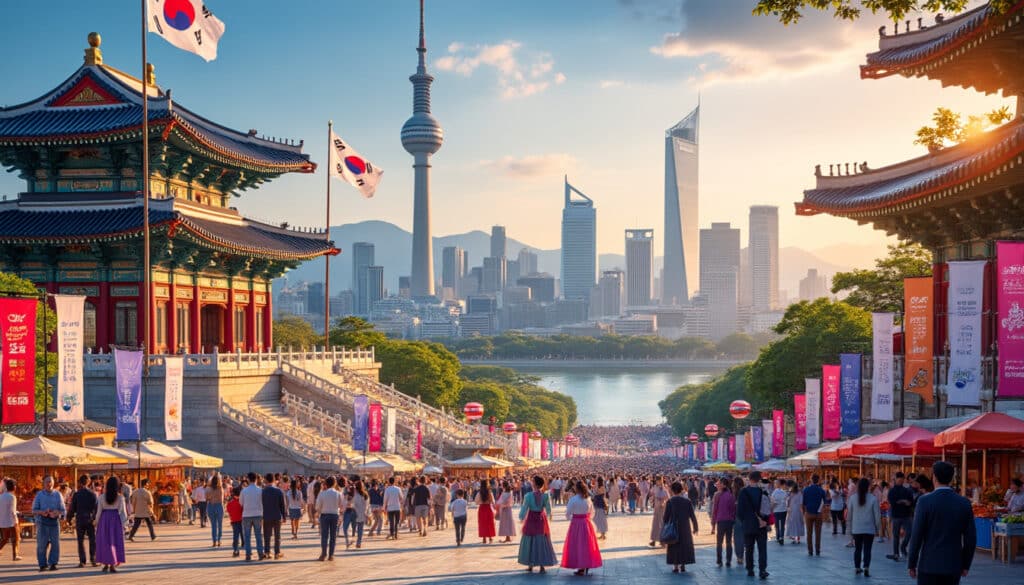
Names, flags, and identity of Seoul
Seoul, a dazzling city that serves as the heart of South Korea, has more to offer than its bustling streets, futuristic skyscrapers, and vibrant culture. Its essence is interwoven with the intriguing tapestry of its names, symbols, and identity. The…
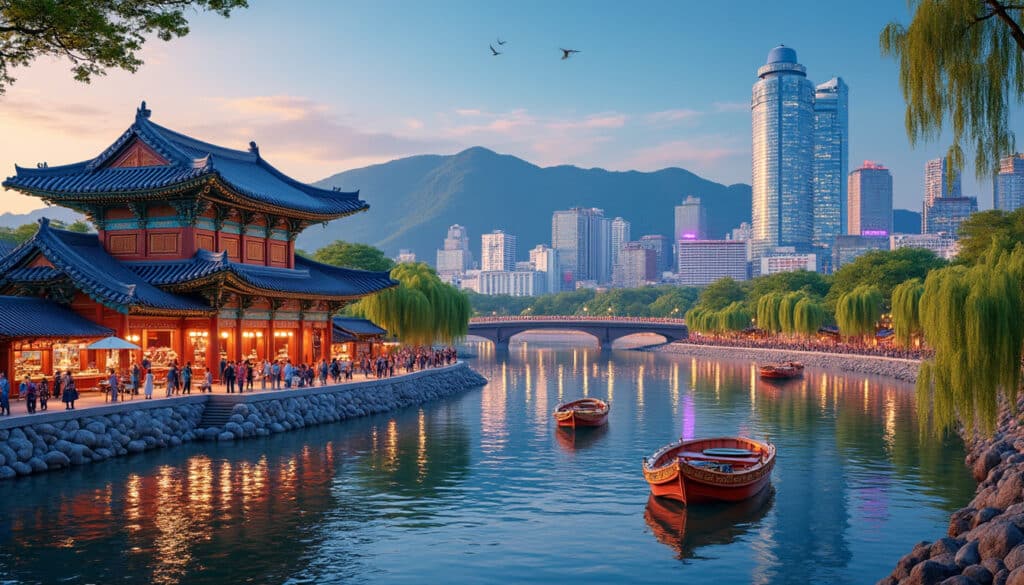
Reputation and identity of Seoul
Seoul, the pulsating heart of South Korea, is a city that gracefully bridges the gap between the past and the future. Known for its towering skyscrapers, neon-lit streets, and a burgeoning tech industry alongside historic palaces, tranquil temples, and bustling…
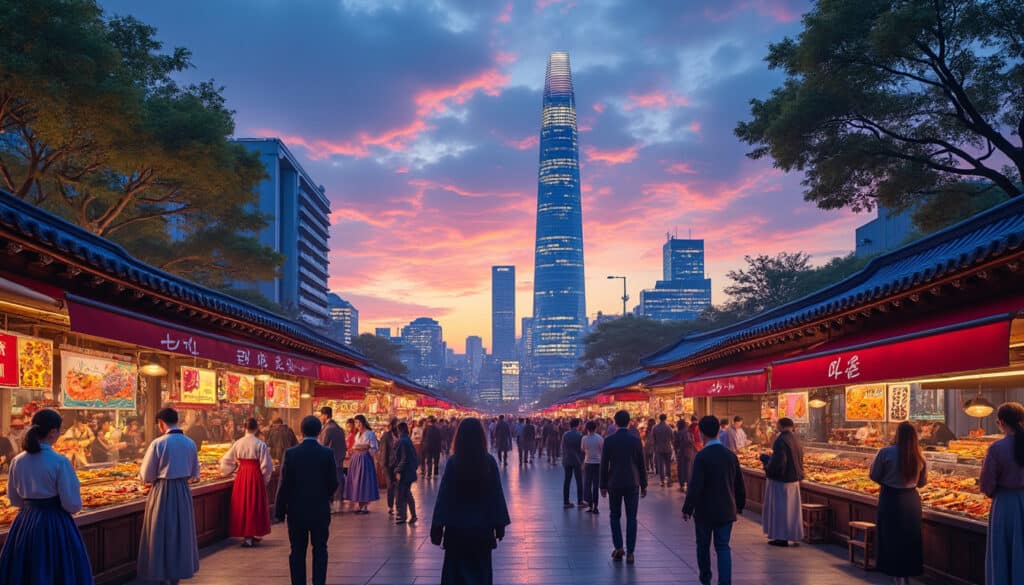
Unusual facts and social issues in Seoul
Seoul, a dazzling tapestry of ancient history and contemporary vibrance, offers explorers an eclectic mix of the unexpected and the familiar. As a hub of innovation with deep cultural roots, Seoul embodies a fascinating blend of contrasts that draw millions…

